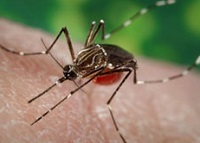 |
| Aedes mosquitoes transmit chikungunya to people.--Courtesy of CDC |
With recent outbreaks in the Caribbean and the Pacific, the U.S. Centers for Disease Control and Prevention (CDC) is concerned that the number of chikungunya cases among travelers will continue to rise. But results from an early-stage clinical trial point to a promising vaccine that may be able to prevent transmission of the disease.
In a Phase I clinical trial of 25 adult volunteers, the experimental vaccine showed protection against the virus, eliciting neutralizing antibodies in all participants, according to a study appearing Aug. 15 in The Lancet.
Trial subjects received one of three different doses of the vaccine--an initial jab, a second one at four weeks and a third one at 20 weeks after the initial injection. Neutralizing antibodies were detected in a majority of the subjects after the first shot. After all three jabs, all dose groups had developed high levels of antibodies against chikungunya virus.
The trial was conducted by the National Institute of Allergy and Infectious Diseases, part of the U.S. National Institutes of Health.
Chikungunya virus disease causes severe joint pain, headache and fever, and no approved vaccines or antiviral therapies are available to treat the disease.
As of Aug. 19, a total of 640 chikungunya virus disease cases have been reported to the CDC, according to the agency, all but four of which were travel-associated. The first U.S.-acquired case of chikungunya was reported in Florida in a man who had not traveled outside the U.S. Only three other U.S. cases have been deemed to be locally acquired, according to the CDC.
During a May meeting of the American Society for Microbiology, Lyle Peterson, director of the CDC's National Center for Emerging and Zoonotic Infectious Diseases, said that chikungunya virus has been "taking off by leaps and bounds" since it first emerged in the Western Hemisphere last fall. More than 570,000 confirmed or suspected cases had been reported throughout the Americas, according to the NIH.
A few vaccine developers--like Themis Bioscience, Inviragen and Arbovox--see the emerging disease as a market opportunity. Other scientists believe that developing a mosquito-control program would be a more effective way to control the disease.
- get FierceBiotech's take
- read the press release
- see the study abstract from The Lancet
- get more from NIH